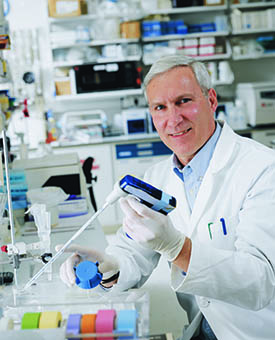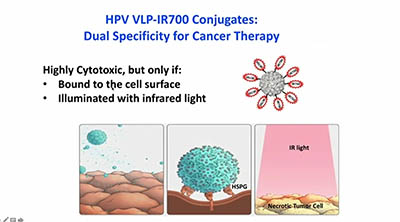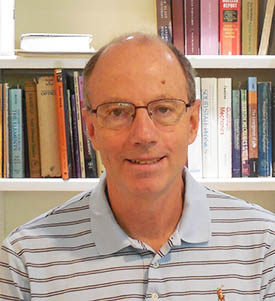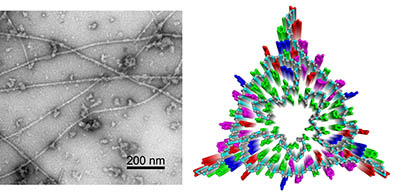Meet the Newest NIH Members of the National Academy of Sciences
Mini Symposium Held to Honor John Schiller and Robert Tycko
On July 21, 2020, the NIH hosted a virtual mini symposium to honor the two NIH investigators who were elected to the National Academy of Sciences (NAS) this year: NIH Distinguished Investigator John Schiller (National Cancer Institute, NCI) and Senior Investigator Robert Tycko (National Institute of Diabetes and Digestive and Kidney Diseases, NIDDK). The NAS is a private, nonprofit organization of the country’s leading researchers and is committed to furthering science in America. Its 2,404 members and 501 foreign associates are active contributors to the international scientific community. The number of current NIH colleagues who have been elected to the prestigious NAS is 50.
John T. Schiller, Ph.D., NCI

CREDIT: RHODA BAER
John Schiller (NCI) helped develop human papillomaviruses (HPV) vaccines for the prevention of cervical cancer and other tumors caused by HPV.
John Schiller has made fundamental contributions to our understanding of the human papillomaviruses (HPV), the most common sexually transmitted infections in the United States. He helped develop the HPV vaccines for the prevention of cervical cancer and other tumors caused by HPV and is developing treatments for other sexually transmitted infections and chronic diseases, including cancer.
Schiller earned a Ph.D. in microbiology from the University of Washington (Seattle) before coming to NIH to work in Douglas Lowy’s lab at NCI in 1983. The two have worked together for more than 30 years and have been honored countless times for their pioneering work studying HPV and developing the HPV vaccines, with awards including the National Medal of Technology and Innovation from President Barack Obama and the Lasker-DeBakey Clinical Medical Research Award. Lowy is also a member of the NAS.

CREDIT: JOHN SCHILLER, NCI
One of Schiller’s projects involves using HPV virus-like particles (VLPs) as “guided missiles” to deliver anticancer drugs to tumors. He found that HPV VLP-IR700 conjugates (IR700 is an infrared dye) can kill cancer cells but only if the conjugates are bound to the cell surface (mediated through cell-surface heparan sulfate proteoglycans, HSPGs) and illuminated with a near-infrared laser. The treatment was successful in treating uveal melanoma (an eye cancer) in phase 1b/2 clinical trials and a phase 3 trial will start soon. The treatment will be tested on other cancers, too. Schiller is also hoping to bring such treatments to low-income settings—handheld ultrasound devices can be used, instead of lasers, to activate the infrared dye, for instance.
During the mini-symposium, Schiller described his research as well as his efforts to bring cancer treatments to low-income countries with limited resources and health-care infrastructure. These countries need simple, inexpensive, and safe interventions for disease. In one project, his research group is attempting to harness preexisting antiviral immunity to treat cancers.
In another project, he is collaborating with the National Institute on Aging to study the effects of injecting peptides derived from viral epitopes (molecular regions on the surface of antigens) into naturally occurring tumors in mice. The idea is that the immune system will recognize the viral epitopes expressed in cancers and recruit T cells that can fight the tumors. The initial results in mouse tumor models are promising, and he hopes that such general therapies can be used as off-the-shelf treatments for many types of cancerous tumors.
Robert Tycko, Ph.D., NIDDK

CREDIT: SASHA K. TYCKO
Biophysicist Robert Tycko (NIDDK) use of solid-state nuclear magnetic resonance (NMR) to investigate the structural properties of molecules has provided new insights into the structure and physical behavior of proteins associated with Alzheimer disease, type 2 diabetes, and AIDS.
Robert Tycko is a biophysicist who uses solid-state nuclear magnetic resonance (NMR) to investigate the structural properties of molecules important to human biology and disease. His research has provided new insights into the structure and physical behavior of proteins associated with Alzheimer disease, type 2 diabetes, and AIDS.
Tycko completed a Ph.D. in chemistry at the University of California at Berkeley (Berkeley, California) and did his postdoctoral training at the University of Pennsylvania (Philadelphia). He then worked as a member of the technical staff at AT&T Bell Laboratories (Murray Hill, New Jersey) for eight years before coming to NIH as a senior investigator in 1994. His development of NMR technology served as a way to bridge his interests in math, physics, chemistry, and building things. At NIH, he roped in biology, too, and explored the biological applications of NMR.

CREDIT: ROBERT TYCKO, NIDDK
Transmission electron microscope image of amyloid-beta fibrils derived from human Alzheimer's disease brain tissue (left) and cross-sectional view of a molecular structural model for these fibrils based on solid state nuclear magnetic resonance data (right). Hydrophobic, polar, negatively charged, and positively charged amino acid sidechains in the molecular model are colored green, magenta, red, and blue.
He recognized the potential of using solid-state NMR and electron microscopy to study protein structures such as the amyloid-beta fibrils that develop in brain tissue of people with Alzheimer disease. Not much was known about the fibrils when Tycko began studying them. Over the years, he has been able to characterize the structure and identify distinct morphologies of amyloid-beta fibrils. Now examining the implications on human health, his lab studies fibrils extracted from patients with Alzheimer disease to see how differing morphologies may affect pathogenesis. Tycko continues to play an instrumental role in developing technologies in structural biology to shed light on the molecular world.
To see a videocast of the National Academy of Sciences Mini Symposium 2020, go to https://videocast.nih.gov/watch=38191.

Lily Nguyen is a postbaccalaureate fellow in the National Cancer Institute’s Laboratory of Molecular Biology. After she completes her training in 2021, she hopes to go to graduate school to pursue a Ph.D. in molecular biology. In her spare time, she’s an avid TV and movie watcher and enjoys going to picturesque places and documenting them on film.
This page was last updated on Tuesday, March 22, 2022
